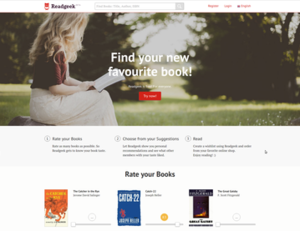
Collaborative filtering (CF) is a technique used by recommender systems. Collaborative filtering has two senses, a narrow one and a more general one.
A review is an evaluation of a publication, service, or company such as a movie, video game, musical composition, book ; a piece of hardware like a car, home appliance, or computer; or softwares such as business software, sales softwares; or an event or performance, such as a live music concert, play, musical theater show, dance show or art exhibition. In addition to a critical evaluation, the review's author may assign the work a rating to indicate its relative merit. More loosely, an author may review current events, trends, or items in the news. A compilation of reviews may itself be called a review. The New York Review of Books, for instance, is a collection of essays on literature, culture, and current affairs. National Review, founded by William F. Buckley Jr., is an influential conservative magazine, and Monthly Review is a long-running socialist periodical.
A recommender system, or a recommendation system, is a subclass of information filtering system that seeks to predict the "rating" or "preference" a user would give to an item.
Personalization consists of tailoring a service or a product to accommodate specific individuals, sometimes tied to groups or segments of individuals. A wide variety of organizations use personalization to improve customer satisfaction, digital sales conversion, marketing results, branding, and improved website metrics as well as for advertising. Personalization is a key element in social media and recommender systems.

AbeBooks is an e-commerce global online marketplace with seven websites that offer books, fine art, and collectables from sellers in over 50 countries. Launched in 1996, it specialises in used, rare and out-of-print books. AbeBooks has been a subsidiary of Amazon since 2008.
Slope One is a family of algorithms used for collaborative filtering, introduced in a 2005 paper by Daniel Lemire and Anna Maclachlan. Arguably, it is the simplest form of non-trivial item-based collaborative filtering based on ratings. Their simplicity makes it especially easy to implement them efficiently while their accuracy is often on par with more complicated and computationally expensive algorithms. They have also been used as building blocks to improve other algorithms. They are part of major open-source libraries such as Apache Mahout and Easyrec.
Reputation systems are programs or algorithms that allow users to rate each other in online communities in order to build trust through reputation. Some common uses of these systems can be found on E-commerce websites such as eBay, Amazon.com, and Etsy as well as online advice communities such as Stack Exchange. These reputation systems represent a significant trend in "decision support for Internet mediated service provisions". With the popularity of online communities for shopping, advice, and exchange of other important information, reputation systems are becoming vitally important to the online experience. The idea of reputation systems is that even if the consumer can't physically try a product or service, or see the person providing information, that they can be confident in the outcome of the exchange through trust built by recommender systems.
Product finders are information systems that help consumers to identify products within a large palette of similar alternative products. Product finders differ in complexity, the more complex among them being a special case of decision support systems. Conventional decision support systems, however, aim at specialized user groups, e.g. marketing managers, whereas product finders focus on consumers.
Cold start is a potential problem in computer-based information systems which involves a degree of automated data modelling. Specifically, it concerns the issue that the system cannot draw any inferences for users or items about which it has not yet gathered sufficient information.
Goodreads is an American social cataloging website that allows individuals to search its database of books, annotations, quotes, and reviews. Users can sign up and register books to generate library catalogs and reading lists. They can also create their own groups of book suggestions, surveys, polls, blogs, and discussions. The website's offices are located in San Francisco. Since 2013 company is owned by the online retailer Amazon.
Discoverability is the degree to which something, especially a piece of content or information, can be found in a search of a file, database, or other information system. Discoverability is a concern in library and information science, many aspects of digital media, software and web development, and in marketing, since something cannot be used if people cannot find it or do not understand what it can be used for. Metadata, or "information about information," such as a book's title, a product's description, or a website's keywords, affects how discoverable something is on a database or online. In the 2010s, adding metadata to a product that is available online can make it easier for end users to find the product. For example, if a song file is made available online, making the title, name of the band, genre, year of release, and other pertinent information available in connection with this song file will make it easier for users to find this song file. Organizing information by putting it into alphabetical order or including it in a search engine is an example of how to improve discoverability. Discoverability is related to, but different from, accessibility and usability, other qualities that affect the usefulness of a piece of information.
MovieLens is a web-based recommender system and virtual community that recommends movies for its users to watch, based on their film preferences using collaborative filtering of members' movie ratings and movie reviews. It contains about 11 million ratings for about 8500 movies. MovieLens was created in 1997 by GroupLens Research, a research lab in the Department of Computer Science and Engineering at the University of Minnesota, in order to gather research data on personalized recommendations.
Personalized search is web search results that are tailored specifically to an individual's interests by incorporating information about the individual beyond the specific query provided. There are two general approaches to personalizing search results, involving modifying the user's query and re-ranking search results.

Gary Robinson is an American software engineer and mathematician and inventor notable for his mathematical algorithms to fight spam. In addition, he patented a method to use web browser cookies to track consumers across different web sites, allowing marketers to better match advertisements with consumers. The patent was bought by DoubleClick, and then DoubleClick was bought by Google. He is credited as being one of the first to use automated collaborative filtering technologies to turn word-of-mouth recommendations into useful data.

A filter bubble is a term coined by the Internet activist Eli Pariser to refer to a state of intellectual isolation that can result from personalized searches when a website algorithm selectively guesses what information a user would like to see based on information about the user, such as location, past click-behavior and search history. As a result, users become separated from information that disagrees with their viewpoints, effectively isolating them in their own cultural or ideological bubbles. The choices made by these algorithms are not transparent. Prime examples include Google Personalized Search results and Facebook's personalized news-stream. The bubble effect may have negative implications for civic discourse, according to Pariser, but contrasting views regard the effect as minimal and addressable. The results of the U.S. presidential election in 2016 have been associated with the influence of social media platforms such as Twitter and Facebook, and as a result have called into question the effects of the "filter bubble" phenomenon on user exposure to fake news and echo chambers, spurring new interest in the term, with many concerned that the phenomenon may harm democracy and well-being by making the effects of misinformation worse.
(Technology such as social media) “lets you go off with like-minded people, so you're not mixing and sharing and understanding other points of view ... It's super important. It's turned out to be more of a problem than I, or many others, would have expected.”

A user profile is a collection of settings and information associated with a user. It contains critical information that is used to identify an individual, such as their name, age, portrait photograph and individual characteristics such as knowledge or expertise. User profiles are most commonly present on social media websites such as Facebook, Instagram, and LinkedIn; and serve as voluntary digital identity of an individual, highlighting their key features and traits. In personal computing and operating systems, user profiles serve to categorise files, settings, and documents by individual user environments, known as ‘accounts’, allowing the operating system to be more friendly and catered to the user. Physical user profiles serve as identity documents such as passports, driving licenses and legal documents that are used to identify an individual under the legal system.
Outbrain is a web recommendation platform that generates revenue for online publishers by displaying feeds of content and ads, or boxes of links to pages within a website, that lead to third-party content, known as chumboxes. Founded in 2006, the company is headquartered in New York City.
Robust collaborative filtering, or attack-resistant collaborative filtering, refers to algorithms or techniques that aim to make collaborative filtering more robust against efforts of manipulation, while hopefully maintaining recommendation quality. In general, these efforts of manipulation usually refer to shilling attacks, also called profile injection attacks. Collaborative filtering predicts a user's rating to items by finding similar users and looking at their ratings, and because it is possible to create nearly indefinite copies of user profiles in an online system, collaborative filtering becomes vulnerable when multiple copies of fake profiles are introduced to the system. There are several different approaches suggested to improve robustness of both model-based and memory-based collaborative filtering. However, robust collaborative filtering techniques are still an active research field, and major applications of them are yet to come.

Gogobot was an online travel business headquartered in Palo Alto, California. The company was rebranded Trip.com in November, 2016 and acquired by the Ctrip Group in 2017. Founded in 2010, by Travis Katz and Ori Zaltzman, by 2014 the company was the fifth most visited travel-planning site in the United States.

Reedsy is a British startup online author services firm based in London which serves as a bridge uniting authors and publishing freelancers in the self publishing industry. While it serves primarily as a clearing house for top publishing talent, the firm has expanded to offer a variety of tools and services for would-be authors.







